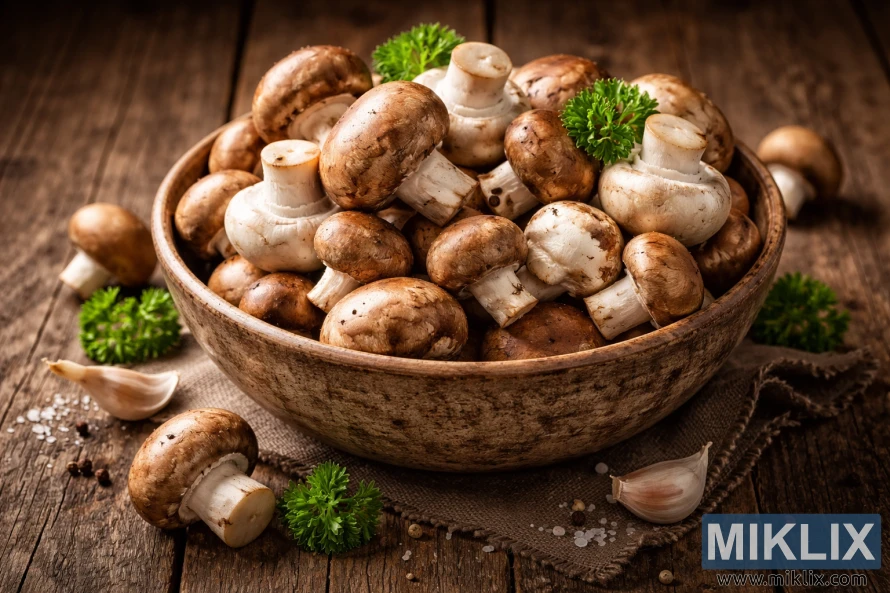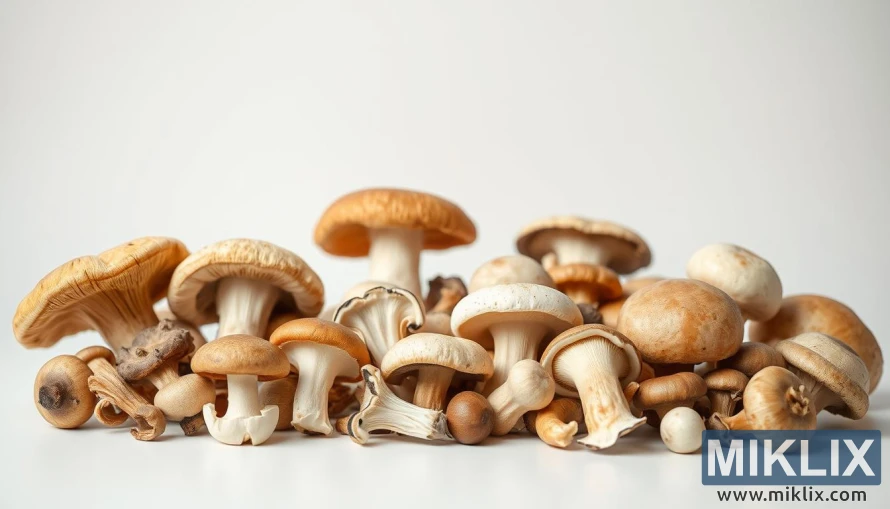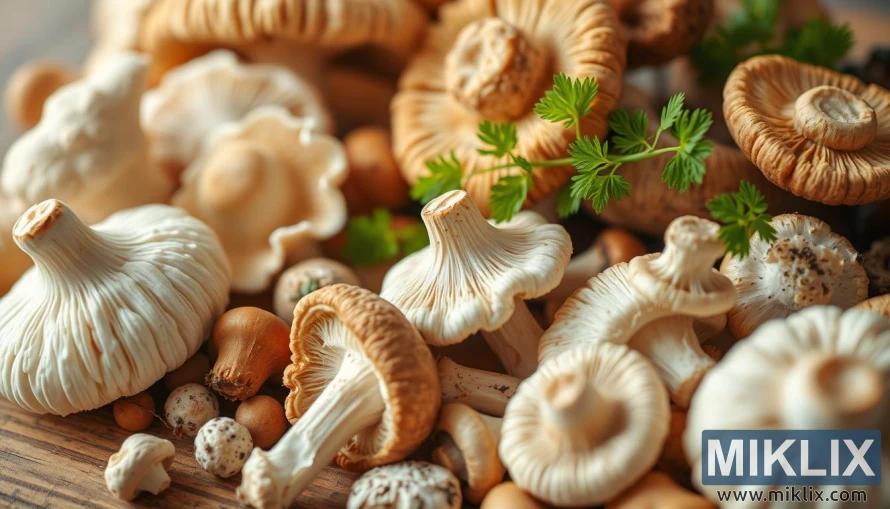Fungi Power: How Eating Mushrooms Could Transform Your Health
Published: May 21, 2025 at 12:41:49 PM UTC
Last updated: December 23, 2025 at 11:13:05 AM UTC
Mushrooms are more than just a tasty addition to meals. They are packed with nutrients that boost your health. They can help prevent cancer, keep your heart healthy, and strengthen your immune system. Let's dive into the many ways mushrooms can improve your health and fight chronic diseases.

Key Takeaways
- Mushrooms provide essential nutrients that contribute to overall health.
- They may help in cancer prevention through their antioxidant properties.
- Incorporating mushrooms can support lower cholesterol levels.
- Mushrooms aid in enriching the immune system's functionality.
- They serve as a delicious way to reduce sodium intake.
- Mushrooms are a natural source of Vitamin D.
Introduction to Mushrooms and Their Health Benefits
Mushrooms are becoming more popular in the U.S., with people eating about three pounds each year. They add flavor to meals without being high in fat or calories. Mushrooms also have health benefits that are being studied and talked about more.
These fungi are not just tasty; they are also packed with essential nutrients. They are low in calories, making them great for those trying to lose weight. Mushrooms also support the immune system, have antioxidant properties, and more.
What Are Mushrooms?
Mushrooms are fascinating organisms that belong to the fungi kingdom. They are often mistaken for vegetables. But, they have a unique way of reproducing by producing spores instead of seeds.
There are over a million identified species of fungi. Only a few are considered edible mushrooms. This variety adds a lot of diversity to cooking.
Some popular edible mushrooms include:
- Cremini mushrooms
- Portobello mushrooms
- Shiitake mushrooms
- Oyster mushrooms
- Morel mushrooms
Each type of mushroom has its own flavor and texture. They make dishes more interesting. Mushrooms are not just good for you, but also add excitement to cooking.
Nutritional Profile of Mushrooms
Mushrooms are great for your diet because of their nutritional value. They are low in calories but rich in vitamins and minerals that are good for your health.
One of the best things about mushrooms is their high levels of:
- Selenium, which helps fight off free radicals
- Potassium, important for keeping blood pressure in check
- B vitamins, like riboflavin and niacin, which help your body use energy
- Vitamin D, which mushrooms get from UV light, helping your bones stay strong
Eating mushrooms can help your immune system and heart health. They add flavor to your meals and give you important vitamins and minerals.

Decrease the Risk of Cancer
Studies show a strong link between eating mushrooms and lowering cancer risk. Eating just 18 grams of mushrooms a day can cut cancer risk by up to 45%. This shows how good mushrooms are for our health when we eat them regularly.
Mushrooms are full of ergothioneine, an antioxidant that helps prevent cell damage. This damage can lead to cancer. Mushrooms like shiitake, oyster, and maitake are known for their cancer-fighting powers.
Lower Sodium Intake with Mushrooms
Mushrooms are a great choice for those looking to cut down on sodium. For example, white button mushrooms have just five milligrams of sodium per cup. This makes them perfect for people trying to control their blood pressure without losing flavor.
Adding mushrooms to your meals can greatly reduce the amount of sodium you eat. This swap keeps your food tasting good and helps you eat healthier. Using mushrooms instead of salty meats or seasonings can also make your dishes more flavorful and nutritious.
Promote Lower Cholesterol Levels
Managing cholesterol is key for heart health. Shiitake mushrooms can help. They contain compounds that might slow down cholesterol production and absorption. Adding them to meals can also help control calories, making them a tasty red meat substitute.
This change not only makes food more enjoyable but also supports a healthier diet. For those looking to lower their cholesterol, shiitake mushrooms are a simple yet effective choice.
Protect Brain Health
Recent studies show a link between eating mushrooms and better brain health. They might help lower the risk of mild cognitive impairment (MCI). MCI is a step before serious dementia.
In Singapore, a study found that eating mushrooms cut the risk of MCI by 50%. This is good news for keeping the brain sharp as we age.
Eating mushrooms regularly could be a simple way to boost brain health. They come in many types, like shiitake and lion's mane. Each type adds unique flavors and nutrients, helping our brains stay healthy.
Source of Vitamin D
Mushrooms are a special food for vitamin D, making them great for boosting your intake. Unlike most fruits and veggies, some mushrooms make vitamin D when they get sunlight. Maitake and portobello mushrooms are top choices for their high vitamin D levels, helping your bones stay strong.
Adding these mushrooms to your meals can help your body absorb more calcium. This is key for keeping your bones healthy. Try them in salads, soups, or stir-fries to increase your vitamin D and enjoy their taste.
Stimulate a Healthier Gut
Mushrooms are key to better gut health because of their special makeup. They have polysaccharides, which are great prebiotics. These help good bacteria in the gut grow. A healthy balance of gut bacteria is good for overall health.
When you eat mushrooms, their carbs stay the same as they go through digestion. They get to the colon, where they feed the good bacteria. This helps keep the gut healthy, boosts immunity, and improves how we absorb nutrients.
- Enhances digestion through prebiotic effects
- Supports the proliferation of healthy gut bacteria
- Contributes to overall gut microbiome balance
- Promotes better nutrient absorption
Eating mushrooms adds great taste to your meals. It also helps keep your gut healthy. This is important for staying in top shape.

Support a Strong Immune System
Mushrooms are packed with nutrients that boost your immune system. They are full of selenium, vitamin D, and vitamin B6. Each of these helps your body fight off sicknesses.
Selenium helps make enzymes that protect cells. Vitamin D keeps your immune system strong. Vitamin B6 is key for cell growth and making red blood cells.
Eating mushrooms can help your body fight off illnesses. It's a simple way to get these health benefits.
The Culinary Versatility of Mushrooms
Mushrooms are amazing in cooking, adding flavor and texture to many dishes. They mix well with other foods, making them loved by chefs and home cooks. You can use them in pizzas, pasta, or soups, making any dish better.
Mushrooms are very flexible. They can be the main ingredient in vegetarian dishes, replacing meat for a filling meal. Portobello and shiitake mushrooms are great for grilling or sautéing because of their texture. Button and cremini mushrooms are perfect for lighter dishes, allowing for creative cooking.
Try different types of mushrooms to enjoy their full flavor. Mixing them in your meals can add surprising layers of taste. Recipes that showcase mushrooms' unique qualities often become favorites, making them a key ingredient in many kitchens.
How to Choose and Prepare Mushrooms
Choosing mushrooms can be fun if you know what to look for. Look for firm, unblemished mushrooms with bright colors. Stay away from mushrooms that look wilted or have changed color. Fresh mushrooms are essential for the best taste and texture in your dishes.
Washing mushrooms needs to be done carefully to avoid making them soggy. A quick rinse under cold water and a gentle pat with a paper towel works well. For delicate mushrooms, a soft brush can help remove dirt without adding too much water.
Mushroom preparation opens up a world of culinary possibilities. Here are a few popular methods to consider:
- Sautéing: This method brings out the rich, earthy flavors of mushrooms, making them perfect for tossing in pasta or adding to stir-fries.
- Simmering: Cooking mushrooms in broth or sauce allows them to absorb flavors, enriching soups and stews.
- Grilling: Grilling mushrooms adds a smoky flavor, making them a great side dish or topping for burgers.
Incorporating mushrooms into various dishes can elevate your meals. Try adding them to omelets, pizzas, or grain bowls for an extra layer of texture and taste. With these tips in mind, mushroom preparation becomes an exciting part of your cooking adventure!

Health Considerations When Eating Mushrooms
Mushrooms are good for you, but eating them safely is key. Not all mushrooms are safe. Some can be very poisonous, making foraging risky without the right knowledge.
For beginners, foraging for wild mushrooms needs caution. Here are a few tips for a safer experience:
- Learn about local mushroom varieties and their characteristics.
- Use a reliable field guide to identify mushrooms.
- Join local foraging groups or workshops to gain hands-on experience.
- Consult experts before consuming any wild mushrooms.
Buying mushrooms from trusted sources is safer. Stores or farmers' markets that focus on edible mushrooms are good choices. They offer mushrooms that are tasty and safe. By knowing what mushrooms are safe and what's not, you can enjoy mushrooms without worry.
Research Supporting Mushroom Health Benefits
A growing body of health research shows the many benefits of mushrooms in our diet. Studies highlight their role in preventing cancer, managing cholesterol, and boosting brain health. These findings prove mushrooms are good for our health.
Key areas of research highlight:
- Studies show mushrooms like shiitake and maitake can slow cancer cell growth.
- They also help lower cholesterol due to their fiber.
- Research links mushrooms to better brain function, making them great for brain health.
This solid scientific evidence helps us make better food choices. It shows mushrooms are a key superfood for our health.
Conclusion
Mushrooms are not just tasty in many dishes. They also offer great health benefits. They are full of nutrients, low in calories, and come in many types. Adding mushrooms to your meals can boost your health.
They can help lower the risk of serious diseases and keep your immune system strong. Whether you like shiitake, cremini, or portobello, there's a lot to discover. Adding mushrooms to your food can make your diet more balanced.
Try different mushrooms in your cooking every day. They are very versatile, making healthy eating fun and rewarding. Start your path to better health with the amazing mushroom.

Further Reading
If you enjoyed this post, you may also like these suggestions:
- Beans for Life: The Plant-Based Protein with Perks
- From Detox to Digestion: The Amazing Health Benefits of Lemons
- Gut Feeling: Why Sauerkraut Is a Superfood for Your Digestive Health
